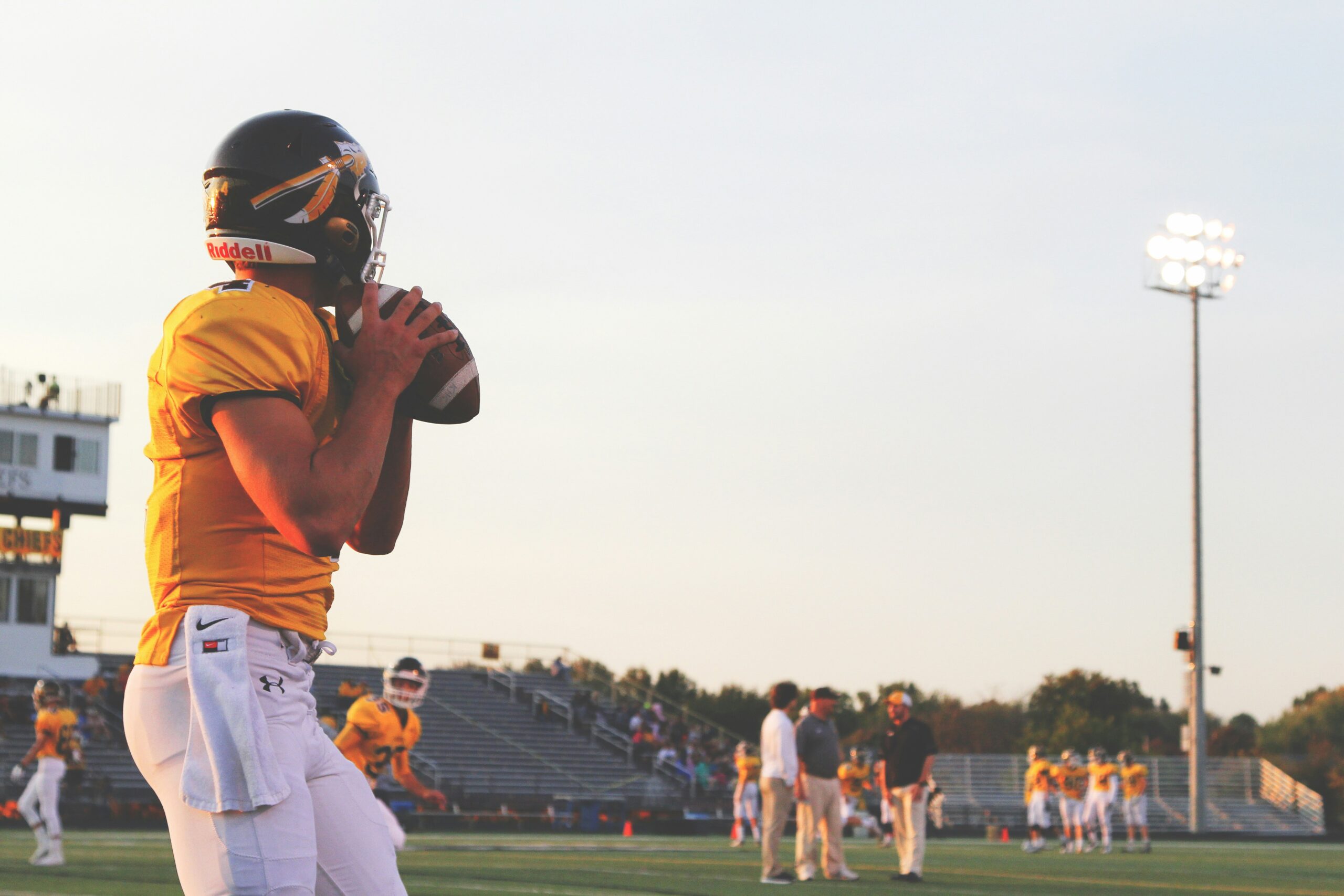Football season has officially begun, and with that comes all of the excitement, camaraderie, and competition. For many, it’s a time of gathering with friends and family to watch their favorite teams compete on TV – usually accompanied by food, drinks, and high emotions.
However, this period also sees a troubling rise in domestic violence cases, a pattern observed in various studies and reported by law enforcement agencies. This increase is complex and multifaceted, and understanding the underlying factors is crucial for addressing the issue.
Research consistently shows a troubling trend: domestic violence incidents spike during major sporting events, especially football games. One study published in the Quarterly Journal of Economics found that domestic violence rates increase by about 10% on days when NFL games are played, particularly when there are unexpected outcomes or high-stakes matchups. These spikes are not limited to the Super Bowl or championship games; they can occur during regular season games as well, especially when games involve local teams or intense rivalries. This community-wide increase of domestic violence is a strikingly large finding, and this pattern suggests a link between the emotional environment of football games and an increased risk of domestic violence.
It’s crucial to recognize that these statistics do not imply that football itself causes domestic violence. Instead, they indicate that certain aspects of the game day environment—such as heightened emotions, alcohol consumption, and cultural factors—can exacerbate abusive behaviors in individuals who already have a propensity for violence. This also isn’t a scenario that is unique to United States football culture – other countries see this uptick in DV cases with their popular sports as well.

As potential explanations for the sports-related increases in domestic violence, researchers often point to the increased familial interaction, alcohol consumption, expectations, and stress levels that accompany high-stakes sports games— all of which are associated with domestic violence.
Alcohol has an undeniable presence within our sporting culture. Many fans indulge in drinking during tailgates, at bars, and at watch parties. Game day rituals often include beer, cocktails, and other alcoholic beverages, sometimes consumed in large quantities. While alcohol itself does not cause domestic violence, it can significantly increase the risk by lowering inhibitions and impairing judgment.
It’s also worth noting that many people drink alcohol during games without becoming violent. The key difference lies in the individual’s underlying behavior patterns and their attitudes toward power and control in relationships. For some, alcohol becomes a tool that exacerbates their abusive tendencies, but it is never the root cause of the violence itself.

Alcohol can intensify emotions and reduce an individual’s ability to think rationally, making it easier for someone prone to anger and violence to act on those impulses. It can also serve as a convenient excuse for abusive behavior, with the abuser blaming their actions on being “drunk” rather than taking responsibility for their choices. This is a dangerous and false narrative, as the root cause of domestic violence lies in the abuser’s desire for power and control over their partner, not in the substances they consume.
Football is also something many would consider to be a highly emotional sport. The excitement, tension, and drama of a close game can lead to extreme emotional highs and lows for fans. When their team wins, the celebration can be euphoric, but when they lose, especially in a close or critical game, the disappointment can be profound. For some individuals, the emotional intensity of these games can lead to increased stress, frustration, and even anger, especially if they are deeply invested in the outcome.
In households where there is already a history of controlling or abusive behavior, these heightened emotions can act as a trigger for domestic violence. An abuser may channel their frustration from the game into violence against their partner, using the loss or perceived injustice in the game as an excuse for their behavior. This misdirected anger can result in emotional, verbal, or physical abuse, further entrenching the cycle of violence.
Additionally, football can serve as an emotional outlet for fans dealing with other stressors in their lives. When their team loses, it can feel like a personal failure or a loss of control, intensifying feelings of inadequacy or anger. In such cases, the abuser may lash out at their partner as a way to reassert control in their personal life, perpetuating the cycle of abuse.
Football, like many contact sports, is also often associated with traditional notions of masculinity—aggression, dominance, and a “win-at-all-costs” mentality. This cultural backdrop can influence attitudes and behaviors both on and off the field. For some, these cultural norms may validate or reinforce harmful attitudes toward power and control in relationships.
The glorification of aggressive behavior in sports can sometimes spill over into other aspects of life. When aggression is celebrated as a virtue in the context of the game, individuals who already have abusive tendencies may feel justified in using similar behavior to exert control in their relationships. This is especially true in environments where there is a lack of accountability for aggressive or violent behavior, and where expressing emotions like anger is seen as a sign of strength rather than a red flag.
Toxic masculinity, which promotes the idea that men should be dominant, unemotional, and aggressive, can also contribute to the rise in domestic violence during football season. In this cultural framework, men may feel pressure to assert their dominance, particularly when they feel their masculinity is threatened by a loss or perceived failure. This can manifest in controlling or abusive behavior toward their partner, as a misguided way to reclaim their sense of power.
Understanding the complex factors that contribute to the rise in domestic violence during football season is essential for addressing the issue. This knowledge can help guide intervention. So, how do we combat this issue?
- Awareness and Education: Raising awareness about the link between football season and domestic violence is a critical step in addressing the issue. Public awareness campaigns can educate fans, communities, and sports organizations about the warning signs of abuse and the importance of seeking help. Education should also focus on challenging harmful cultural norms that glorify aggression and dominance, promoting healthy relationships and emotional regulation instead.
- Support Systems: Providing support and resources for those affected by domestic violence is crucial, especially during high-risk periods like football season. Hotlines, shelters, and counseling services should be readily accessible to victims, and community organizations can play a role in offering safe spaces and support networks. Sports leagues and teams can also get involved by supporting anti-violence initiatives and promoting messages of respect and non-violence.

- Challenging Excuses: It’s essential to challenge the narrative that alcohol or heightened emotions excuse abusive behavior. Public messaging and interventions should make it clear that the responsibility for abuse lies solely with the abuser. This approach shifts the focus from external factors to the individual’s choices and actions, promoting accountability and the importance of addressing underlying abusive tendencies.
- Know who to call: If you or someone you know is ever in a situation where there may be intimate partner violence surrounding a sporting game, please do not hesitate to reach out to your local law enforcement or Options Domestic and Sexual Violence Services.
Football season should be a time of celebration and community, not one of fear and violence. The rise in domestic violence cases during this period is a stark reminder of the deeper issues that need to be addressed. By acknowledging the problem, challenging harmful behaviors, and providing support to those affected, we can work toward ensuring that the passion for the game does not spill over into harm off the field. Addressing this issue requires a collective effort, involving individuals, communities, and sports organizations, to create an environment where the thrill of the game is enjoyed safely and responsibly.
If you need any additional information, have a question, or a concern, feel free to reach out to Options at our 24-hour toll-free helpline 800-794-4624. You can also reach an advocate via text by texting HOPE to 847411 or click 24-Hour Chat with Options.
Written by Anniston Weber
This project was supported by subgrant number 24-VAWA-07 awarded by the Kansas Governor’s Grants Program for the Office on Violence Against Women, U.S. Department of Justice’s STOP Formula Grant Program. The opinions, findings, conclusions, and recommendations expressed in this publication/program/exhibition are those of the author(s) and do not necessarily reflect the views of the Office of the Kansas Governor or the U.S. Department of Justice.


